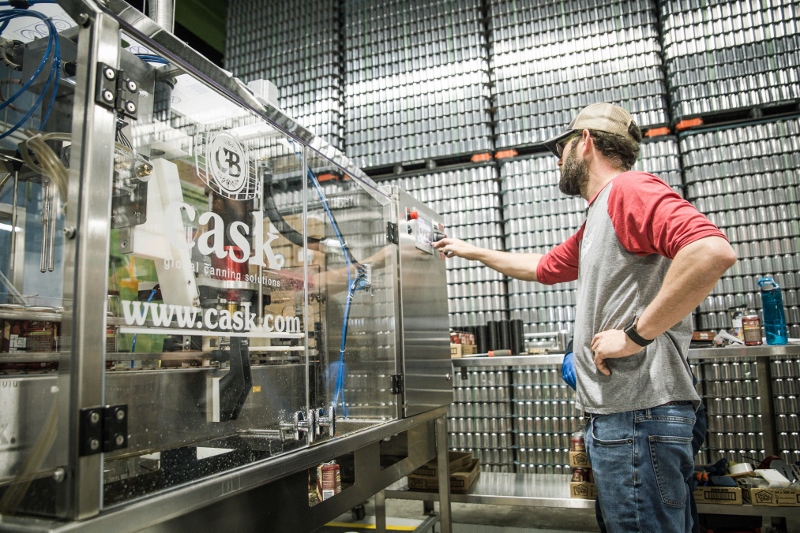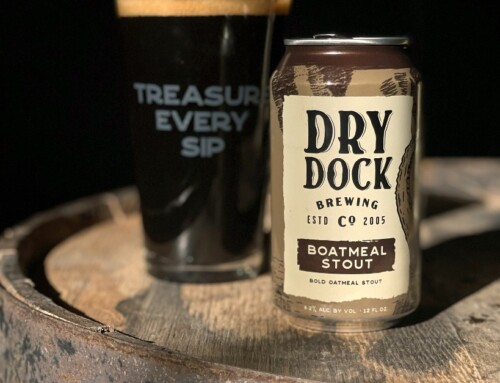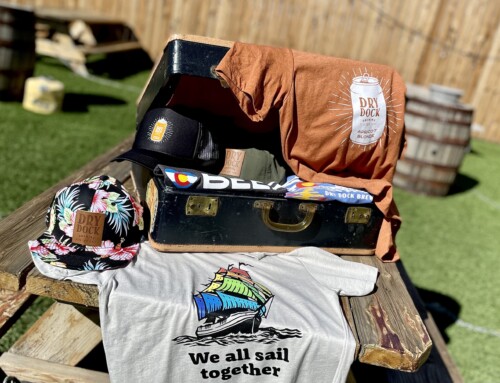The February/March issue of Beverage Master has a wonderful feature on micro0canning. It has loads of info on my pioneering allies at Cask Global Canning Solutions, and some insights from me from the early days of canned craft beer. An excellent piece by Robin Dohrn-Simpson, here’s the text of it below.
—
Canning Your Craft Beer
Marty Jones of Cask Global Canning Solutions has worked tirelessly for nearly twenty years convincing brewers that cans were the right way to package craft beer. He was one of the founders of Oskar Blues Brewery’s “Canned Beer Apocalypse” and remembers the pioneer days of canned craft beer. “I would serve canned beers at fests, and folks would walk by and wave and say ‘I don’t drink canned beer,’ and follow that remark with some additional misinformed comment, such as ‘Cans are bad for beer,’ or ‘Cans impart metallic flavors to beer.’ Many brewers thought we were nuts, heathens, committing sacrilege by questioning the long-revered brown bottle. A few breweries wished misfortune upon us! I always made a point to talk about the benefits of cans, not the negatives of bottles, and that helped to temper some of the backlash. Most consumers loved the idea.”
Many of those benefits include fitting in with into the younger generation’s more environmentally conscious and active lifestyle.
“Cans are welcome in loads of places where bottles are not,” Jones said. “They dramatically shrink shipping costs and energy consumption for shipped beer. They are Mother Nature’s preferred beer package and the most recycled beverage package on the planet. They make it super easy to take goose-bumping beer to the beach, the boat, the backcountry, the bathtub, and other places where beer is a treasured life enhancer.”
Cans also provide protection that isn’t necessarily guaranteed with bottles.
“Cans lock in the flavor of beer better than even dark glass bottles,” according to Mother Road Mobile Canning’s website, motherroad.com. “In glass bottles (especially green and clear ones) beer can become lightstruck, a condition caused when ultraviolet light breaks down hop-derived isohumulones, breaking them apart and allowing them to bind with sulfur atoms, creating a skunky, off-flavor. This flavor is so common that some people think the skunky character is a normal flavor in some beers. Oxidation is another problem for bottled beer. Bottle caps allow oxygen to pass into the beer making it stale.”
Cans provide a full 360 degrees chance for advertising as well, which according to Sarah Brennan, Marketing and Sales Coordinator for Palmer Canning Systems, “is a draw when you want your product to stand out on a shelf.”
Canned Beer Apocalypse
While working at Oskar Blue’s in 2002, Jones recalls, “We purchased Cask’s original tabletop one-can-at-a-time seamer/filler and became the first U.S. craft brewer to brew and can their beer. At that time a couple of craft brewers had beer in cans that was brewed and canned by others under contract.”
Jones and Oskar Blues went out of their way to make cans exciting, crushing stereotypes and creating the kind of beers that consumers wanted, attracting a following of beer drinkers who helped change the industry.
“For the first few years, I spent most of my time debunking the myths about aluminum cans and talking about the many wonders of cans, rather than talking about the beers we squeezed into those cans. That helped change the perceptions. We made a point of putting especially luscious beers into those cans, to inspire more craft beer lovers to give them a chance. That was super helpful, too,” said Jones. “Slowly, other risk takers took the chance on cans and started to reap the benefits and fast-rising sales. Nowadays the perception of cans in comparison to bottles has changed about 180 degrees. There are still a few can cynics and doubters out there, and people who simply prefer the feel and time-tested merits of bottles. But the most maligned and scorned package a craft brewer could once consider has now become the package of choice for many discerning brewers and beer drinkers. Brewers who swore they would never put their beer in a can have now added the mighty aluminum can to their packaging, or tossed out their bottles completely.”
Purchase vs. Mobile Canning Lines
There are many considerations when deciding whether to purchase, lease or rent a mobile canning unit. Mobile canning services are a great way to get into cans without any capital outlay. Many brewers start with a mobile canner and then eventually move to purchase their own canning lines.
Mobile canning lines offer the convenience of coming to you, no matter the size of your brewery. Every state has a variety of companies to assist you. The advantages of their systems are that they have provided the capital outlay for the equipment. Most mobile canning companies will help with inventory management of cans, ends, handles, case flats and off-site storage options. They focus on the canning so you can focus on the brewing.
However, with the rise in cans and use of mobile canners, some brewers find the service not quite worth it.
“While they can make your packaging very easy, their service comes at a cost. We often hear complaints that busy mobile canners are hard to schedule, and their quality control in terms of dissolved oxygen and product loss rates can be lacking, depending on the quality of the operator. Many brewers also don’t feel comfortable turning something as crucial as their packaging over to someone else,” said Jones.
For those canning less than 300 cases a month, mobile canning is often a great choice. However, for those filling 300 cases or more each month, it may be more beneficial to buy an in-house canning line. Often, an in-house system pays itself off within one to two years, and brewers have complete control over all aspects of packaging and filling.
“If you plan to put your product in cans for the long term, the point to purchase your own canning line is right away. The payback period on a purchase is two years at 300 cases a month and one year at 500 cases a month. On top of that, you’ll have full control over your packaging schedule and quality control program. At 500 cases a month, we have literally saved some customers thousands of dollars per month by helping them buy or finance their own canning system,” said Russell Love, President of Cask Global Canning Solutions.
Creating Your Canning System
Canning system manufacturers like Cask Global and Palmer Canning Systems work with breweries to ensure they make the right choice of canning line for their size, output and budget.
“As you build the system that works for your brewery, keep in mind that Cask offers systems that cater to all budgets down to the nano-brewery level and an entire range of systems from manual systems with as little as a two, three, six or 10-head fill stations systems. We can customize canning systems and accessories for just about any beverage type, and we also provide brite (unpainted) or printed aluminum cans to our customers as well,” Love said.
Palmer Canning System’s Brennan told Beverage Master Magazine that they can customize a system for beverages from beer, wine and coffee to energy drinks and infused juices. “The market is really dictating the rise of canning now. There has been so much data to support that canning your beverage is the better process for quality in things like total package oxygen and DOs. Canning is the way to go, we have just been a part of the steady incline of cans,” she said. “We fabricate fully customizable entire systems at our manufacturing facility in Lafayette, Indiana. We have no problem working with other vendors to incorporate ancillary items to a line, although we also design things like weight checkers and date coders in house.”
Palmer Canning offers fixed and mobile versions of Craft-in-Line can filling and seaming systems, as well as Craftbulk, an empty can de-palletizer; Wavegrip, an auto carrier applicator; Propurge, can filling valves; Craftrinse, an empty can rinser; and Craftdry blower systems.
Cleaning Your Cans
Whether you purchase a custom designed system or put together a variety of components that fit your brewery or a combination thereof, Carleton Helical Technologies has created a can and bottle cleaner suited for existing production lines.
“Our equipment is very versatile. We can easily integrate it into existing lines which is easier than developing a new line,” said Nick Carleton, President of Carleton Helical. “The beauty of our cleaner is that it is very simple to install and operate. It is very rare that we have to install or do start-ups, although we do offer the service. Our cleaner has been used in both can and bottling lines, providing easy change-over with our proprietary HP Inverters [that flip] the cans over for cleaning and back.”
Carleton Helical’s cleaners provide customers the option to clean with ionized air, water or any cleaning solution, starting at 10 cans per minute. “This system is also being used for code dating, flipping the can over for the code date and inspection. This provides a very simple method to place the cans in position for the code date,” said Carleton.
What’s on the Horizon
A trend that’s already common in the brewing world seems to be reaching out into the canning world as well: collaboration.
“We are seeing a real interesting growth in the collaboration space where breweries are partnering with other local craft beverage producers (coffee, cider, Kombucha, craft sodas or craft spirits, etc.) to provide affordable co-packing,” said Cask Global’s Jones. “We design all our canning systems to be very easy to switch between slim, sleek and standard diameter cans which allows a brewery the ability to run 250 mL slim nitro cold brew coffee cans or 12-ounce sleek Kombucha cans one day a week. It’s a great model for cool collaborations and also financial efficiency.”







Leave A Comment